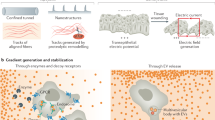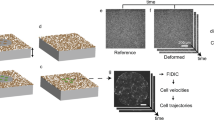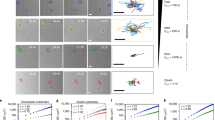Abstract
Wolpert, Macpherson and Todd1 have recently described some experiments on the effects of temperature on the spreading and rounding up of cultured cells. They believe their findings invalidate the “passive” theory of tissue cell movement which I have previosly put forward2. In this theory, the advancement of the cell margin during spreading or locomotion is considered to be passive in the sense that it is analogous to the spreading of a liquid on a suitably wettable surface. It is helpful to express the theory in terms of surface (interfacial) tensions because it places adequate emphasis on the part played by the medium and the substrate.
This is a preview of subscription content, access via your institution
Access options
Subscribe to this journal
Receive 51 print issues and online access
$199.00 per year
only $3.90 per issue
Buy this article
- Purchase on Springer Link
- Instant access to full article PDF
Prices may be subject to local taxes which are calculated during checkout
Similar content being viewed by others
References
Wolpert, L., Macpherson, I., and Todd, I., Nature, 223, 512 (1969).
Carter, S. B., Nature, 213, 256 (1967).
Carter, S. B., Exp. Cell Res., 42, 395 (1966).
Author information
Authors and Affiliations
Rights and permissions
About this article
Cite this article
CARTER, S. Cell Movement and Cell Spreading: a Passive or an Active Process ?. Nature 225, 858–859 (1970). https://doi.org/10.1038/225858a0
Received:
Issue Date:
DOI: https://doi.org/10.1038/225858a0
This article is cited by
-
The role of cell adhesion proteins?laminin and fibronectin?in the movement of malignant and metastatic cells
Cancer and Metastasis Review (1985)
Comments
By submitting a comment you agree to abide by our Terms and Community Guidelines. If you find something abusive or that does not comply with our terms or guidelines please flag it as inappropriate.



